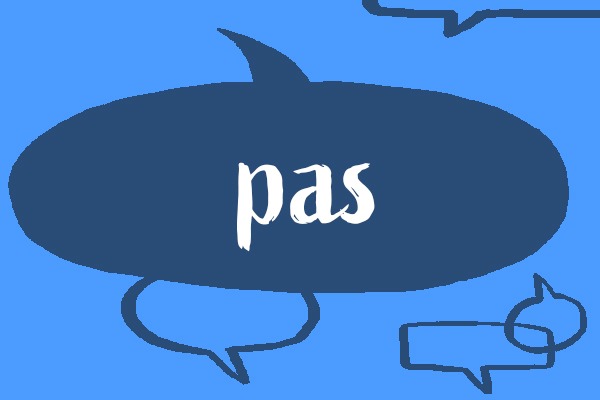We’re back again with another French word – this week we’re looking at pas.
To hear how to pronounce it, listen to the audio:
Even if you’ve only just started learning French, you’ve probably seen the word pas used a lot already.
Pas is an adverb – a word that describes an action or an adjective. If you need a little refresher on what we mean by this, check out our Easy Learning French Grammar pages on adverbs, adjectives and verbs.
The interesting thing about pas is that it’s also a noun. However, try not to let this confuse you – it has a completely different meaning from the adverb! Let’s get into the details.
Pas as an adverb means not, and it is used to make any verb negative. It normally appears in a verb phrase with the word ne – the verb is preceded by ne (or n’) and followed by pas.
ne … pas not
Je vais à la plage. I am going to the beach.
Je ne vais pas à la plage. I am not going to the beach.
Est-ce que tu as une voiture ? – Non, je n’ai pas de voiture. Do you have a car? – No, I do not have a car.
Si elles ne rentrent pas avant minuit, je verrouille la porte. If they’re not back home by midnight, I’m locking the door.
There are also phrases, including certain set phrases, where you can use pas to make the phrase negative, but don’t need to say ne … pas.
Pas moi. Not me.
Pas de glaçons, merci. No ice, thanks.
Voulez-vous venir ou pas ? Do you want to come or not?
Ça va ? – Pas mal. How are things? – Not bad.
While the meaning of pas indicates a negative in French, it does not always mean that it needs to be translated by a negative phrase in English – for example:
pas mal de quelque chose a lot of something
Il y avait pas mal de vin à la fête. There was quite a lot of wine at the party.
As we mentioned, pas as a noun means something completely different. It’s a masculine noun, so you might see it along with un, le, or du.
un pas a step; a pace; a footstep
marcher à grands pas to stride
un pas en arrière a step backwards
pas à pas step by step
Nous avons entendu ses pas dans le couloir. We heard his footsteps in the corridor.
L’école est à deux pas d’ici. The school is just round the corner from here.
We hope that this blog series is helping you to improve your understanding of French vocabulary step by step. See you again for another word next week.
Written by Holly Tarbet, freelance copywriter and editor.
All opinions expressed on this blog are those of the individual writers, and do not necessarily reflect the opinions or policies of Collins, or its parent company, HarperCollins.




collins_dictionary_official
The home of living language. #wotd #wordlovers #collinsdictionary
Read our word of the week definitions and blog posts: